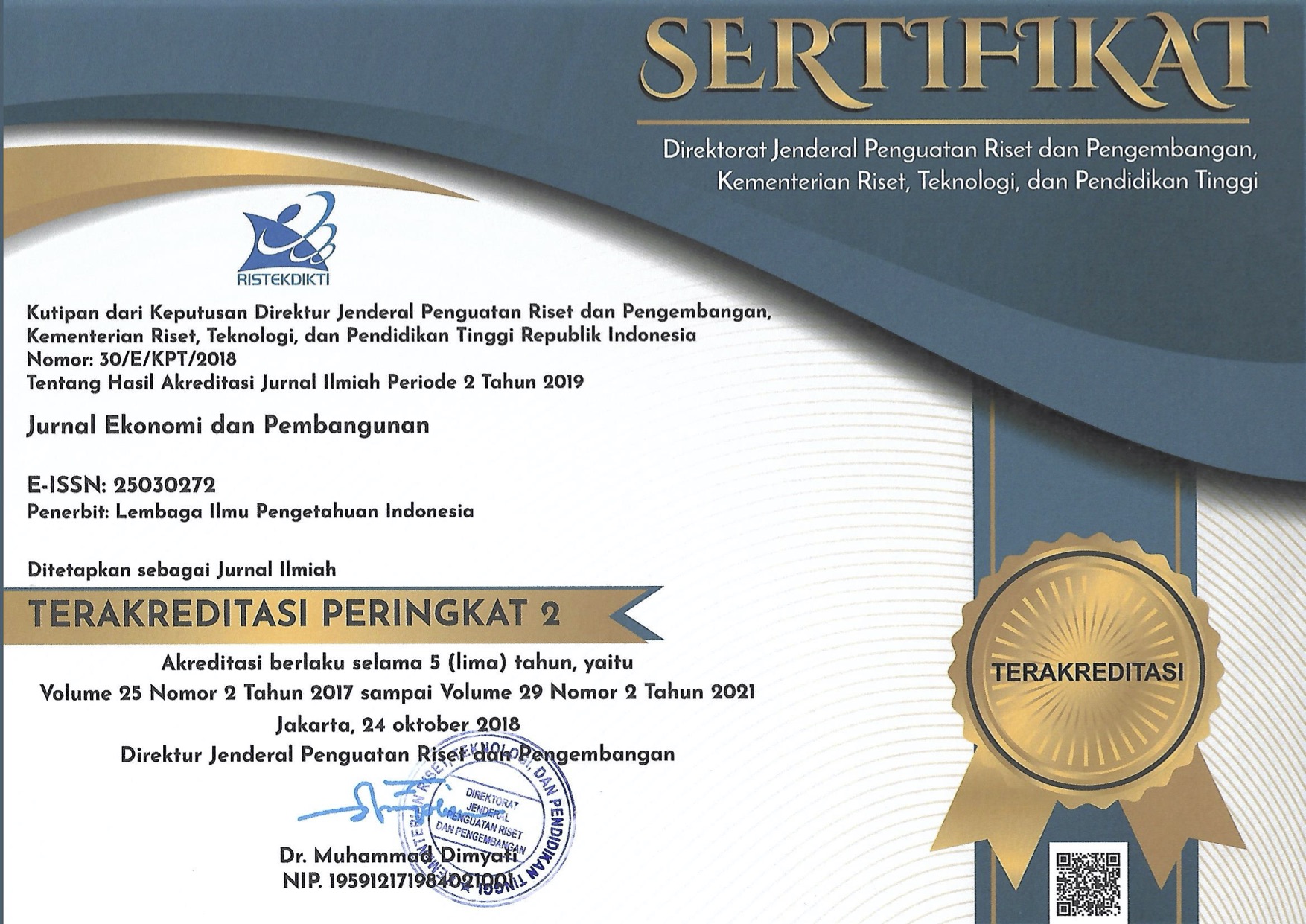PERANAN SUKU BUNGA KREDIT, CAPITAL ADEQUACY RATIO (CAR) DAN LOAN TO DEPOSIT RATIO (LDR) BAGI PERTUMBUHAN EKONOMI INDONESIA
Studi Kasus : Bank Pembangunan Daerah
Abstract
Controlling the banking-monetary in such a way needs to be done so that dynamic of real sector growth developed to expected way. This study is intended to analyze the role of credit interest rate instrument, development of capital adequacy ratio (CAR), and loan to deposit ratio (LDR) to Indonesian economics growth in the last ten years. By using multiple linear stepwise regression analyzing method approach, a very significant role simultaneously and partially from credit interest rate instrument and development of CAR push the Indonesian economics growth in a long term were found. Meanwhile, there’s no a significant roles from development of LDR to the Indonesia economics growth in a medium term. The modeling results have adjusted R-square of about 87,80 percent and met all the diagnostic assumption test, while 12,20 percent is explained by other variables outside the model.
Downloads
References
Anggraini, D., Haryadi, 2020. Analisis Peran Kredit Perbankan Dalam Pendanaan Usaha Mikro, Kecil, dan Menengah (UMKM) Serta Hubungannya Dengan Pertumbuhan Ekonomi di Provinsi Jambi, Jurnal Paradigma Ekonomika, Jambi : Program Pascasarjana Universitas Jambi.
Badan Pusat Statistik, 2021. Tingkat Suku Bunga Kredit Rupiah Menurut Kelompok Bank, https://bps.go.id/indikator/13/383/1/suku-bunga-kredit-rupiah-menurut-kelompok-bank.html, Diakses Tanggal 20 Mei 2021.
Faizal, A.D., Syapsan, Widayatsari, A., 2020. Pengaruh Pertumbuhan Kredit Perbankan dan Pertumbuhan Jumlah Orang Bekerja Terhadap Pertumbuhan Ekonomi Provinsi Riau, Pekbis Jurnal, Pekanbaru : Program Pascasarjana Universitas Riau.
Iswari L., Muharir, 2021, Pengaruh Covid-19 Terhadap Aktivitas Pertumbuhan Ekonomi di Indonesia, Jurnal Ilmiah Mahasiswa Ekonomi Syariah, Palembang : STEBIS Indo Global Mandiri.
Lantemona, I.A., Koleangan, R.A.M., Walewangko, E.N., 2021. Pengaruh Belanja Modal, Penyaluran Kredit dan Tingkat Suku Bunga Terhadap Pertumbuhan Ekonomi di Provinsi Sulawesi Utara, Jurnal Pembangunan Ekonomi dan Keuangan Daerah, Manado : Fakultas Ekonomi dan Bisnis Universitas Sam Ratulangi.
Otoritas Jasa Keuangan, 2021. Statistik Perbankan Indonesia, https://www.ojk.go.id/id/kanal/perbankan/data-dan-statistik/statistik-perbankan-indonesia/Default.aspx, Diakses Tanggal 20 Mei 2021.
Qinthara Z., M.N., SBM, Nugroho, 2021, Anaslisis Pengaruh Mitigasi Risiko Likuiditas dan Penyaluran Kredit Terhadap Pertumbuhan Ekonomi dan Stabilitas Harga Indonesia Tahun 2010.1 – 2019.4, Diponegoro Journal of Economics, Semarang : Fakultas Ekonomi dan Bisnis Universitas Diponegoro.
Norhidayah, 2018. Pengaruh Kredit Sektoral Terhadap Pertumbuhan Ekonomi Provinsi Kalimantan Selatan, Jurnal Ilmu Ekonomi dan Pembangunan, Banjarmasin : Fakultas Ekonmi dan Bisnis Universitas Lambung Mangkurat.
Safitri, W.R., 2015. Analisis Korelasi Pearson Dalam Menentukan Hubungan Antara Kejadian Demam Berdarah Dengue Dengan Kepadatan Penduduk di Kota Surabaya Pada Tahun 2012-2014, Surabaya : Program S1 Ilmu Kesehatan Masyarakat Universitas Airlangga.
Setiawan, I., 2020. Analisis Peran Perbankan Terhadap Pertumbuhan Ekonomi di Indonesia : Bank Syariah Versus Bank Konvensional, Jurnal Akuntansi, Ekonomi dan Manajemen Bisnis, Bandung : Politeknik Negeri Bandung.
Copyright (c) 2022 Author(s)

This work is licensed under a Creative Commons Attribution-NonCommercial-ShareAlike 4.0 International License.
Terms and Conditions of Publication
1. Author's Rights and Authorities
As an author, you (or your employer or institution) may do the following:
-
make copies (print or electronic) of the article for your own personal use (not for commercial purpose), including for your own classroom teaching use;
-
make copies and distribute such copies (including through email) of the article to research colleagues, but not allowed to distribute commercially and systematically, e.g. via an email list or list server;
-
present the article at a meeting or conference and to distribute copies of the article to the delegates attending such meeting;
-
retain all proprietary rights in any process, procedure, or article of manufacture described in the work;
-
include the article in full or in part in a thesis or dissertation;
-
use the article or any part thereof in a printed compilation of your works, such as collected writings or lecture notes, and other derivative works, with full acknowledgement to JEP as the original journal publishing the article;
-
may reproduce material extracted from the article or derivative works for the author's personal use, but must consider the copyrights procedure.
All copies, print or electronic, or other use of the paper or article must include the appropriate bibliographic citation for the article’s publication in the journal.
2. Requests from Third Parties
Although authors are permitted to re-use all or portions of the article in other works, this does not include granting third-party requests for reprinting, republishing, or other types of re-use. Requests for all uses not included above, including the authorization of third parties to reproduce or otherwise use all or part of the article (including figures and tables), should be referred to P2E-LIPI by going to our website at http://ekonomi.lipi.go.id/.
3. P2E LIPI Copyright Ownership
Economic Research Center, the Indonesian Institute of Sciences (P2E-LIPI) owns the copyrights to reproduce, distribute, disseminate, translate, and other uses in accordance with the existing Laws and Regulations.
Every accepted manuscript should be accompanied by "Copyright Transfer Agreement" prior to the article publication.

This work is licensed under a Creative Commons Attribution-NonCommercial 4.0 International License.
JEP Journal by P2E-LIPI is licensed under a Creative Commons Attribution-NonCommercial-ShareAlike 4.0 International License. Permissions beyond the scope of this license may be available at http://jurnalekonomi.lipi.go.id/index.php/JEP
If you are a nonprofit or charitable organization, your use of an NC-licensed work could still run afoul of the NC restriction, and if you are a for-profit entity, your use of an NC-licensed work does not necessarily mean you have violated the term.





